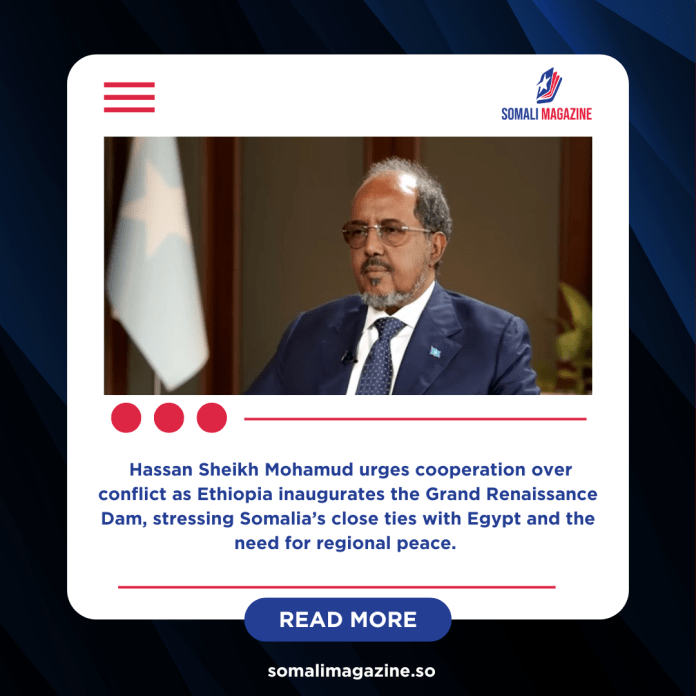Facebook Twitter (X) Instagram Somali Magazine - People's Magazine
Somali President Hassan Sheikh Mohamud has raised concerns about the impact of Ethiopia’s massive Grand Renaissance Dam project, saying it is an issue that affects the entire Horn of Africa and, more specifically, countries along the Nile such as Egypt and Sudan.
In an interview with Al-Arabiya television, President Mohamud described the project as sensitive, stressing that the only way forward is through dialogue and cooperation. He said the matter should be resolved in a way that ensures fairness for all sides, avoiding actions that could fuel new tensions in a region already struggling with instability.
The Grand Ethiopian Renaissance Dam, commonly known as GERD, has been a point of dispute since Ethiopia began construction in 2011 on the Blue Nile near the Sudanese border. Now fully inaugurated, the hydropower facility is the largest in Africa, with a designed generating capacity of more than 5,000 megawatts and the ability to store 74 billion cubic meters of water. Ethiopia sees the dam as a transformative project that will power its development and provide electricity across the region. But Egypt and Sudan have long expressed fears that the dam could restrict their access to vital Nile waters, which millions of people depend on for drinking, farming, and industry. Addis Ababa has maintained that the project will not cause harm to downstream countries, but Cairo and Khartoum remain cautious.
President Mohamud said Somalia is watching the situation closely, especially because developments on the Nile have far-reaching effects on regional stability. He emphasized that while Somalia maintains ties with Ethiopia, this does not come at the expense of its relationship with Egypt. On the contrary, he highlighted the strong and historic bond between Somalia and Cairo. According to the President, Egypt has been an important partner to Somalia, offering training for Somali military forces, logistical support, and assistance in strengthening security. He described this cooperation as evidence of Egypt’s commitment to helping stabilize Somalia.

The Somali leader urged that regional peace and development must always be given priority over actions that could cause divisions or mistrust. He warned against allowing disputes over resources to become sources of conflict, saying constructive dialogue is the best path forward. His comments came at a time when speculation about possible wars in the region was circulating in some media outlets. Specifically, rumors of renewed hostilities between Ethiopia and Eritrea had begun to spread. However, President Mohamud dismissed such talk as baseless, saying there were no real signs that the two neighbors were heading toward war.
His balanced message reflects Somalia’s broader diplomatic approach—seeking cooperation with its neighbors while keeping strong partnerships with key allies such as Egypt. For Mogadishu, maintaining regional harmony is not only about security but also about creating an environment where development can thrive. The President’s call for constructive engagement comes at a crucial moment, as Ethiopia’s dam, now fully operational, marks a turning point in the Nile water dispute. How Ethiopia, Egypt, and Sudan navigate this challenge will likely shape the future of relations across the Horn of Africa and beyond.
For Somalia, which has faced decades of conflict and instability, the emphasis is clear: peace and development must come first, and disputes like the one surrounding the Nile should be handled through dialogue rather than confrontation.

